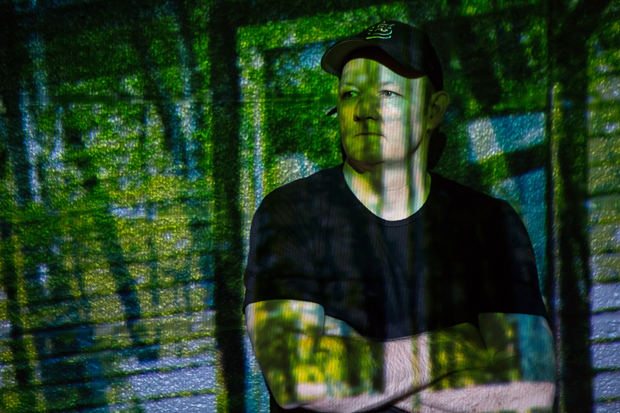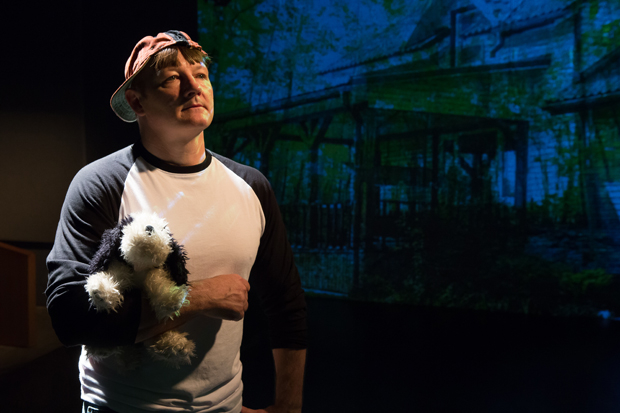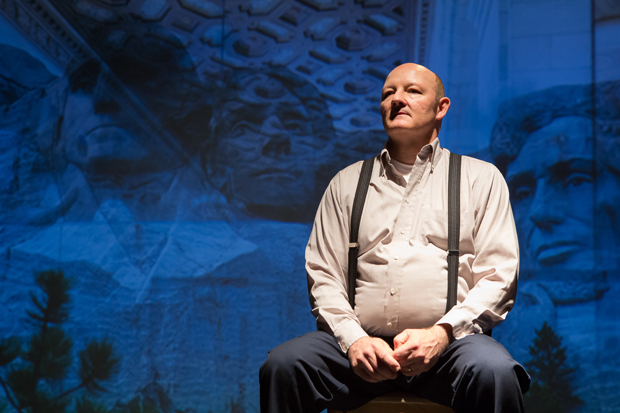Outside Paducah: The Wars at Home
Just because you’re back from “over there,” doesn’t mean the war is over.

(© Hunter Canning)
Paducah, Kentucky, is about as far from the East Village as you can possibly get. At least, it feels that way in J.A. Moad's Outside Paducah: The Wars at Home, now making its New York debut with Poetic Theater Productions at the Wild Project. Shabby-chic reigns in that theater's neighborhood, an expensive veneer of grunge to satisfy the bohemian fantasies of recent transplants. In the world of this play, shabbiness is not so much an aesthetic choice as it is a practical reality brought on by deindustrialization and creeping poverty. Moad gives a distinctly lyrical voice to one of the most neglected groups of people living in the middle of the country: military veterans and their families.
Outside Paducah is actually three solo plays written and performed by Moad, all taking place between St. Louis and Paducah, where the Ohio River meets the Mississippi. Moad (who is a former Air Force pilot) opens with Our Ghost, in which he plays the 7-year-old son of an Afghanistan vet with a traumatic brain injury. It's a confusing first act since Moad is obviously a grown man playing a child, and this is how we meet him for the first time. He speaks to us directly in the unedited patter of a particularly garrulous child, the kind who likes to reveal mom and dad's secrets to complete strangers. It's awkward.

(© Hunter Canning)
The second act, "Cairo (Pronounced K-Row)," takes place in a Paducah bank office. A 51-year-old man speaks to a loan officer, and in doing so inevitably digresses into stories about his father and son (both veterans). This considerable exposition spins off into ruminations about white flight and the decay of towns like Cairo. "Cairo didn’t die cuz of poor black folks," he says, affecting Sorkinesque vocal gravity, "Cairo died from a broken heart."
Such schmaltz is liable to give you a toothache with its saccharine overload. Moad is really at his best when his language is saltier. That's why the third act, "Quittin' Meth," is the strongest of the three. It is told from the perspective of an Iraq War vet who returns to his hometown for a night of drinking at the one remaining dive bar. When one of his friends departs the scene with a "thank you for your service," he describes that phrase hitting him like "a hand job from your grandma," and our revulsion instantly makes us feel how our narrator feels about that perfunctory affirmation of patriotism.
Director Leah Cooper works to illuminate Moad's language in her barebones staging, which is part confessional solo performance, part poetry slam. Lisa Renkel's indelible projections bring images of war and death into the room and make up the most extravagant and memorable design element. Sean Hagerty's psychological sound design helps us to get inside the headspace of our subjects, especially during a disturbing flashback in the third act. It doesn't always make up for Moad's one-note delivery, but it helps.

(© Hunter Canning)
Whatever the faults in Moad's performance, one has to admire his drive to bring a vitally important subject to the stage, one that is frustratingly underrepresented in our theater. Despite regular paeans to "the troop" and their service, our general disinterest in America's veterans is apparent in their absence from our culture. Sadly, American audiences generally don't care about their stories, as a mostly empty theater demonstrated the night I attended the play. Even though Outside Paducah isn't perfect, it's worth seeing if only to be a part of the solution to that shameful indifference.








